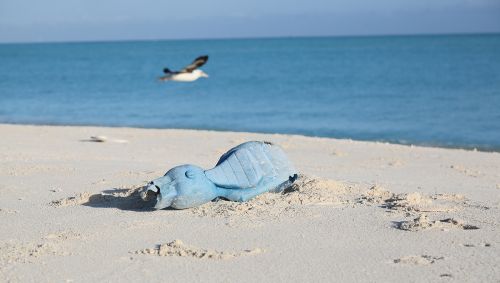Is Marine Debris Impacting Your Beach Day, and Your Wallet?
Imagine you’ve planned a big day at the beach with your family and friends, loaded up the car with supplies, and traveled out to your favorite spot, only to find a beach littered with plastic beverage bottles, stray fishing line, chip bags, cigarette butts, and other debris. Would you stay and play, or be on your way? This is the choice that many face when heading to their local beaches.
Debris on beaches is not only ugly, it can be hazardous to people on the sand or out in the water, and it could also be costing you money!
 In a study funded by the NOAA Marine Debris Program, it was found that the presence of debris on beaches influences our decisions to go to a beach littered with debris, or spend money seeking out a cleaner spot. Focusing on southern California, the study surveyed residents in Orange County to understand what features are most important when they consider visiting a beach. These included a scenic view, convenient parking, the distance from their home, and even whether or not the beach is suitable for recreational activities like surfing or fishing. However, most important to residents is that no marine debris is on the beach, and that it features good water quality.
In a study funded by the NOAA Marine Debris Program, it was found that the presence of debris on beaches influences our decisions to go to a beach littered with debris, or spend money seeking out a cleaner spot. Focusing on southern California, the study surveyed residents in Orange County to understand what features are most important when they consider visiting a beach. These included a scenic view, convenient parking, the distance from their home, and even whether or not the beach is suitable for recreational activities like surfing or fishing. However, most important to residents is that no marine debris is on the beach, and that it features good water quality.
In order to find a beach that fits the bill, residents of southern California find themselves travelling farther from their local beaches, and spending more money as a result. Overall, this results in losses of millions of dollars every year. By reducing marine debris on beaches by just 25 percent, Orange County residents could save roughly $32 million during summer months by decreasing travel distances to enjoy the beach.
The study only focused on one county in the United States, where tourism generated over $1.5 trillion in economic output in 2016, according to the Department of Commerce SelectUSA Program. In a country where one out of every 18 Americans is employed in a travel or tourism-related industry, the potential effects marine debris has on this sector of the economy is substantial.
 In order to better understand the financial impacts of marine debris around the country, the NOAA Marine Debris Program is partnering with Abt Associates to conduct a Regional Pilot Study in a first attempt to link beach trip choices with estimates of marine debris at beaches. The regions of interest for this work include the Great Lakes (OH), Mid-Atlantic (DE), Gulf of Mexico (AL), and West Coast (CA). Using this information and data from the previous Orange County study, we can evaluate changes in tourism spending based on increases or decreases in marine debris, improve our understanding of the economic impact of marine debris, and prioritize areas of the United States where future prevention and removal efforts might be needed.
In order to better understand the financial impacts of marine debris around the country, the NOAA Marine Debris Program is partnering with Abt Associates to conduct a Regional Pilot Study in a first attempt to link beach trip choices with estimates of marine debris at beaches. The regions of interest for this work include the Great Lakes (OH), Mid-Atlantic (DE), Gulf of Mexico (AL), and West Coast (CA). Using this information and data from the previous Orange County study, we can evaluate changes in tourism spending based on increases or decreases in marine debris, improve our understanding of the economic impact of marine debris, and prioritize areas of the United States where future prevention and removal efforts might be needed.
So, where does the debris on beaches come from? Well, it comes from us! People are the sole cause of marine debris, but that means we can also be the solution. You can help reduce marine debris on beaches by practicing these simple tips and tricks:
- Reduce your waste footprint. Reduce the amount of waste you bring to the beach by choosing reusable bottles, food containers, and coolers.
- Dispose of trash properly, no matter where you are. Whether you are inland, or on the beach, trash can travel. Wind, rain, and storms can push trash and litter into storm drains and streams, where it can travel to our ocean and Great Lakes.
- Keep track of your beach toys. Make sure to keep an eye on your beach toys, like balls, sand shovels and nets. What may seem like a good place to leave your stuff while you go explore, may soon be covered in water as the tide rises. These plastic items can quickly wash out to sea and become marine debris.
- Pack it out. No trash cans, or only overflowing bins at your beach? No problem! Pack up all of the trash you bring to the beach and dispose of it properly once you get home.
- Clean up debris. Spend a couple of minutes picking up the debris around you when you leave the beach, and dispose of it properly. Want to do more? Join a local cleanup, or start your own using the Marine Debris Tracker app!

 An official website of the United States government.
An official website of the United States government. 
